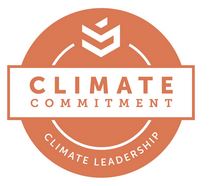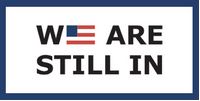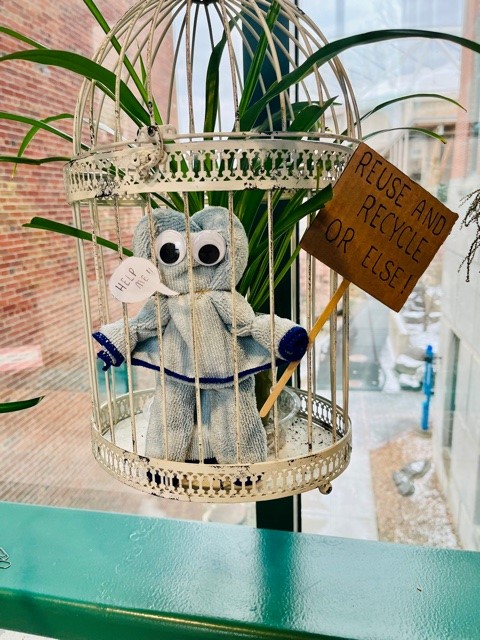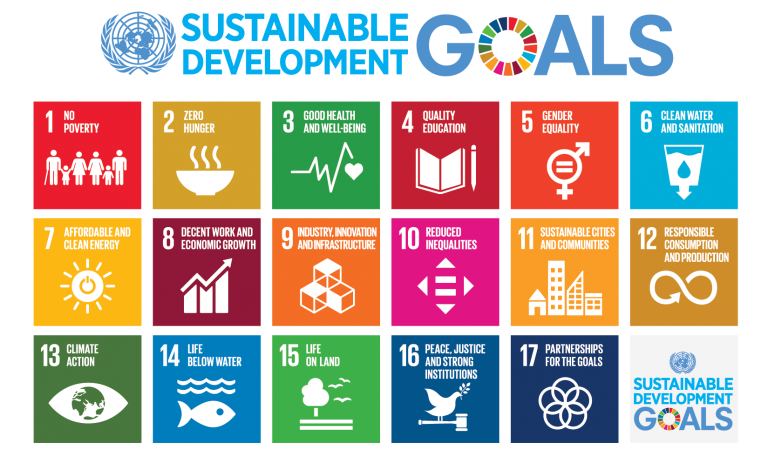Sustainability at ESF
Goals and Progress

ESF has many, high reaching sustainability related goals. The sections below outline these goals and provide a snapshot of our progress in meeting them. Visit Explore by Impact Area and Explore by Project or Initiative for deeper detail about these programs and more.
ESF Energy & Carbon Goals
 In 2007, former ESF President Neil Murphy made ESF a charter signatory of the American
College and Universities President's Climate Commitment (ACUPCC), now Second Nature. This action committed ESF to becoming a carbon neutral campus by reducing emissions
to the maximum extent possible and offsetting remaining emissions to achieve net zero
greenhouse gas (GHG) emissions. ESF is well on its way to achieving this goal, having
reduced GHG emissions by 25% since 2007. The College's Clean Energy Master Plan is expected to decrease GHG emissions by another 15%. Upon Plan implementation, the
College will have reduced its emissions by 40%, as compared to 2007 levels. Currently,
ESF's largest sources of GHG emissions are purchased steam, natural gas and electricity.
The College is working to reduce these sources of emissions through a variety of clean
energy projects.
In 2007, former ESF President Neil Murphy made ESF a charter signatory of the American
College and Universities President's Climate Commitment (ACUPCC), now Second Nature. This action committed ESF to becoming a carbon neutral campus by reducing emissions
to the maximum extent possible and offsetting remaining emissions to achieve net zero
greenhouse gas (GHG) emissions. ESF is well on its way to achieving this goal, having
reduced GHG emissions by 25% since 2007. The College's Clean Energy Master Plan is expected to decrease GHG emissions by another 15%. Upon Plan implementation, the
College will have reduced its emissions by 40%, as compared to 2007 levels. Currently,
ESF's largest sources of GHG emissions are purchased steam, natural gas and electricity.
The College is working to reduce these sources of emissions through a variety of clean
energy projects.
 ESF is a New York State Energy Research & Development (NYSERDA) REV Campus Challenge member. This program, "promotes clean energy efforts by recognizing and supporting
colleges and universities in New York State that implement clean energy projects and
principles on campus, in the classroom, and in surrounding communities." ESF is a
member campus (Leader) and has committed to investing in clean energy projects across all campuses, embracing
clean energy curricula and research & development, and aims to deeply engage in these
efforts with the surrounding community. ESF's staff and faculty attend annual REV
Campus Challenge workshops.
ESF is a New York State Energy Research & Development (NYSERDA) REV Campus Challenge member. This program, "promotes clean energy efforts by recognizing and supporting
colleges and universities in New York State that implement clean energy projects and
principles on campus, in the classroom, and in surrounding communities." ESF is a
member campus (Leader) and has committed to investing in clean energy projects across all campuses, embracing
clean energy curricula and research & development, and aims to deeply engage in these
efforts with the surrounding community. ESF's staff and faculty attend annual REV
Campus Challenge workshops.
 We Are Still In is a joint declaration of support for climate action, signed by more than 3,900 CEOs,
mayors, governors, college presidents, and others. The organizations they represent
comprise the largest and most diverse coalition of actors ever established in pursuit
of climate action in the United States.
We Are Still In is a joint declaration of support for climate action, signed by more than 3,900 CEOs,
mayors, governors, college presidents, and others. The organizations they represent
comprise the largest and most diverse coalition of actors ever established in pursuit
of climate action in the United States.
NYS Directives
The College is also subject to NYS mandates and SUNY system directives associated with energy and carbon reduction targets, which include the following:
SUNY's Clean Energy Roadmap (PDF): Outlines a multitude of system wide goals and actions
SUNY Construction Fund Directive 1B-2 (PDF): Defines goals and assists SUNY in achieving deep energy retrofits of existing buildings and net zero carbon new buildings
NYS Climate Leadership and Community Protection Act (CLCPA): Requires NYS to achieve a carbon free electricity system by 2040 and reduce greenhouse gas (GHG) emission by 95% by 2050 (based upon 1990 baseline). ESF has set a goal of purchasing 100% of its electricity from renewable energy sources.
Learn more about progress made in attaining these goals by visiting our Buildings impact area and LEED/WELL project pages.
Zero Waste Goals
ESF has set the following materials management (zero waste) goals:
- Reduce the "waste" that the College sends to landfill and/or incineration by 90% by 2025 (compared to 2018 baseline)
- Achieve a diversion rate of 90% by 2025 (recycle and/or compost 90% of the items that we discard on campus)
- Obtain TRUE Pre-Certification at the Syracuse campus (Portfolio)
-
Implement and uphold the College's policies related to zero waste, including the Green Purchasing and Break Free From Plastic Policy and Sustainable Facilities Maintenance and Renovation Policy
- Deeply engage with other institutions of higher education, SUNY and NYS to assist and lead the transition to circular operations state, region and nationwide
"Waste" includes items that can not be reduced at the source, reused, recycled or composted. The College places a heavy emphasis on source reduction and is in the process of systematically identifying single use, non-essential items on campus for removal or replacement.
We are also working to identify opportunities to more effectively reuse surplus equipment and furniture. At its heart, our zero waste program seeks to recognize value in the materials that we bring to and use on campus and to spark members of the campus community to rethink what they truly need to live and enjoy their lives both on and off campus.
Zero Waste Progress
Since 2018, trash produced by all ESF campuses has declined from ~365,000 lbs to 214,850 lbs (41% decrease). At the Syracuse campus, trash during this time period declined from 235,000 to 92,000 lbs (61% decrease). The campus-wide diversion rate now stands at 52% with the Syracuse campus boasting a 65% diversion rate. In 2018, the campus-wide diversion rate was 28% and the Syracuse campus diversion rate was 31%.
Visit Zero Waste & Circularity to learn more about how we have achieved this progress and to view data from 2018-2022.

A member of the College's custodial team created this adorable advocate for reuse and recycling on campus
NYS Goals
New York State has created and enacted many materials management policies to help lead the state (and country) in reducing the amount of material that New Yorkers send to landfills and incinerators.
The Bag Waste Reduction Law went into effect on March 1, 2020 and the DEC began enforcing the law and regulations on October 19, 2020. This Law bans plastic carryout bags (other than an exempt bag) from distribution by anyone required to collect NYS sales tax.
In 2020, NYS adopted the nation's strongest statewide ban of expanded polystyrene, single-use foam food and beverage containers, and polystyrene loose fill packaging materials, commonly known as packing peanuts. These bans have an effective date of January 1, 2022.
NYS passed the Food Donation and Food Scraps Recycling Law in 2019. The Law has an effective date of January 1, 2022 and stipulates that businesses that generate an annual average of at least 2 tons of wasted food per week must donate excess edible food and recycle (compost) all remaining food scraps if they are within 25 miles of an organics recycler.
NYS created its Beyond Waste Plan in 2010. This Plan shifted the focus from "end-of-the-pipe" waste management techniques to looking more "upstream" and more comprehensively at how materials that would otherwise becomes waste can be more sustainably managed. The State Department of Environmental Conservation (DEC) is currently updating this plan.
Executive Order No. 4 established the State green procurement and Office of General Services sustainability program. It created a number of green procurement specifications that state agencies (including ESF) must follow. EO 4's goals are to reduce risks from toxic substances, minimize pollutant discharges, minimize volume and toxicity of packaging, maximize the use of recycled content and provide other environmental benefits. Explore the Green Purchasing & Break Free From Plastic Policy page for more information about sustainable purchasing requirements on campus.
Executive Order No. 18 was issued in 2009 and eliminates New York State's purchase and use of bottled water in state facilities. Bottled water is costlier than tap water and is not necessarily safer. State funds should never be used to purchase plastic water bottles and members of the campus community should avoid providing them (and all single use bottles) at events, meetings and conferences to the greatest extent possible. Individuals should also prioritize use of reusable water bottles in their day to day activities on campus.
Executive Order 22 was issued in September 2022. Among many other items, this Order mandates that affected entities (including ESF) create waste diversion plans that include a reduction in waste generated, conduct waste audits, divert organic material and eliminate single use plastics. Reporting related to these activities is required.
Environmental & Social Justice Goals
ESF recognizes the tremendous need to fight for environmental and social justice on campus and beyond. Our goal is to create a diverse and welcoming campus environment, for people of all lived experiences, and to challenge all on campus to confront their biases, both those acknowledged and unconscious.
The Office of Sustainability actively collaborates with the Office of Inclusion, Diversity & Equity (OIDE) and prioritizes hiring student employees and Office staff members with diverse lived experiences.
We challenge members of the campus community to:
- Attend OIDE led events,
- Identify and acknowledge your implicit biases and actively work to adjust automatic patterns of thinking and overcome unconscious discriminatory behaviors and thoughts (Harvard's Project Implict tool will help you to identify your implicit biases),
- Engage in environmental and social justice planning discussions on campus,
- Learn from, amplify and advocate for those with perspectives different from their own,
- Stand against problematic processes, conversations, and assumptions through direct action and discussion,
- Participate in mentorship programs and provide opportunities for traditionally underrepresented people who are part of the campus community,
- Incorporate environmental justice topics into their areas of influence (ex: coursework, club activities, hiring practices, program implementation etc.).
Visit our Environmental & Social Justice impact area page for more information.
Sustainable Development Goals
SUNY ESF is committed to supporting the advancement of the UN Sustainable Development Goals (SDGs) through continual action and campus engagement.
The Office of Sustainability is working to integrate the SDGs into ESF's operations, initiatives, and curriculum. More information coming soon!
